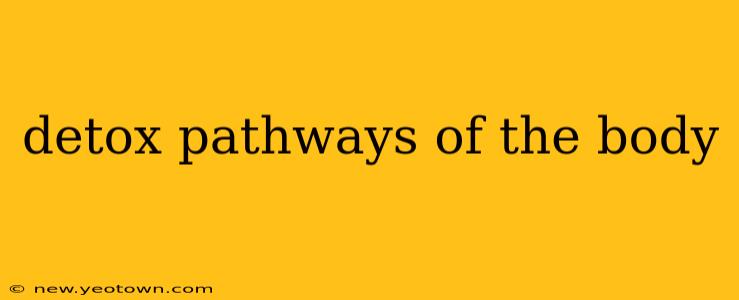We often hear about "detoxifying" the body, but what does that actually mean? It's not about some magical cleanse; it's about understanding the incredible, intricate system your body already possesses to eliminate toxins. Think of your body as a highly efficient machine, constantly working to filter and remove unwanted substances. Let's explore the fascinating pathways your body uses to stay clean and healthy.
What are the main organs involved in detoxification?
This is a fantastic question, and the answer isn't just one organ, but a complex network! The stars of our detoxification show are the liver, kidneys, lungs, skin, and intestines. Each plays a crucial, unique role in removing different types of toxins.
The Liver: The Detoxification Powerhouse
Imagine the liver as a sophisticated chemical processing plant. It's the main player in detoxification, receiving toxins from the bloodstream and transforming them into less harmful substances that can be easily excreted. This process involves several phases, including:
- Phase 1: Toxins are modified to make them more water-soluble.
- Phase 2: These modified toxins are conjugated (attached to other molecules) to make them even easier to eliminate.
The liver's remarkable ability to handle various toxins – from alcohol to medications to environmental pollutants – is a testament to its vital role in maintaining our health.
The Kidneys: The Filtration Experts
The kidneys are masterful filtration systems. They filter blood, removing waste products like urea and creatinine, and excess water and electrolytes. This filtered waste then becomes urine, which is excreted from the body. The kidneys constantly work to maintain the body's fluid and electrolyte balance, a crucial part of overall detoxification.
The Lungs: Exhaling Toxins
Our lungs aren't just for breathing in oxygen; they're also crucial for getting rid of volatile toxins. Carbon dioxide, a waste product of metabolism, is exhaled through the lungs. Other volatile compounds, like certain chemicals and gases, are also expelled through this pathway.
The Skin: Sweating Out Toxins
Sweat isn't just a cooling mechanism; it's also a pathway for eliminating some toxins. Through sweat glands, the skin helps to remove waste products, excess salts, and even some heavy metals. While the amount of toxins eliminated through sweat is relatively small compared to other pathways, it still plays a supporting role in overall detoxification.
The Intestines: The Elimination Champions
The intestines play a vital role in eliminating toxins through the process of defecation. Waste products, undigested food, and some toxins are expelled from the body via the stool. Maintaining a healthy gut microbiome is also important for efficient elimination and overall detoxification.
How can I support my body's natural detoxification processes?
Supporting your body's natural detoxification processes involves making healthy lifestyle choices. Think of it as optimizing the performance of your body's built-in cleaning crew.
- Hydration is key: Drinking plenty of water helps flush out toxins through the kidneys.
- Nourishing your body: A balanced diet rich in fruits, vegetables, and whole grains provides the nutrients your detox organs need.
- Prioritizing sleep: Adequate sleep allows your body to repair and rejuvenate itself, including its detoxification systems.
- Managing stress: Chronic stress can negatively impact detoxification. Stress-management techniques like exercise, meditation, or yoga can be beneficial.
- Avoiding exposure to toxins: Limiting exposure to environmental pollutants, excessive alcohol, and smoking can significantly reduce your body's detoxification burden.
What are some common misconceptions about detox?
Many "detox" products and programs promise rapid and dramatic results, but they often lack scientific evidence. Your body's natural detoxification systems are highly efficient, and relying on these products isn't necessary and could even be harmful. Remember, a healthy lifestyle is the best approach to supporting your body's natural detoxification processes.
Are there any specific foods that can help detox?
While there's no single "detox" food, a diet rich in fruits and vegetables, high in antioxidants and fiber, supports liver and gut health. Cruciferous vegetables (broccoli, cauliflower) are known for their ability to support detoxification pathways.
In conclusion, your body has a remarkable built-in detoxification system. Supporting this system through a healthy lifestyle is the most effective way to ensure your body efficiently eliminates toxins and maintains optimal health. Remember to consult with a healthcare professional before making any significant changes to your diet or lifestyle.

